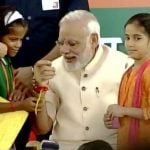Prime Minister David Cameron hit back on Monday at critics who accuse him of using scare tactics to keep Britain in the European Union, saying he was behind “Project Fact” not “Project Fear”.
Talking to students in the eastern English town of Ipswich, Cameron sought to play down deep divisions in his Conservative Party, saying any debate over EU membership should be about issues not individuals.
But he challenged some of his closest allies who want to leave the 28-member bloc to explain what lay ahead if Britons voted with them at a June 23 referendum, and to stop hiding behind arguments offering the “illusion of sovereignty”.
“The only project I am interested in is ‘Project Fact’,” Cameron told dozens of students at University Campus Suffolk.
“If ‘Project Fact’ is about saying ‘stay’, then you know what you get: the (EU single) market open, jobs being created, businesses locating here, financial services being able to trade all over Europe. If you leave, you don’t have those facts, you have a lot of uncertainty.”
After a weekend when two government ministers accused the “In” campaign of belittling Britain by suggesting it could not cope outside the EU, Cameron was keen to project a positive argument for staying in.
But it is clear that, for the Conservative Party and much of Britain, the battle lines have been drawn.
Two students at the event, Tom Baker and Jim Mitchell, said the prime minister was impressive, but Baker said he was still not convinced of the argument. Mitchell liked the argument but not the man. Neither can vote as they are not yet 18 years old.
Cameron’s decision to allow Conservative party members to campaign according to their conscience has exposed divisions and over the last week, the prime minister has had a veiled war of words with popular London Mayor Boris Johnson of the “Out” camp.
Some of his ministers have called for a truce, and Cameron was quick to say that the debate on EU membership should be one on policy, not personality.
“On Europe, in political parties, as sometimes in families, or in universities or in communities, there are divisions: some people want us to stay, some people want us to go,” he said.
“What we need to do over the next four months is have an argument about the issues.”
But he pulled no punches against the “Out” campaign and urged students to turn out to vote, mindful that many who support leaving the EU are older and traditionally more likely to vote than younger generations.
“I hope that you’ll put that date in your diary and you’ll exercise your democratic right on the 23rd of June because, in the end, you … will decide our future, in or out,” he said.
“It may well be your first vote; I would say please exercise it. This is a very important choice for our country.”
[Source:- Reauters]



